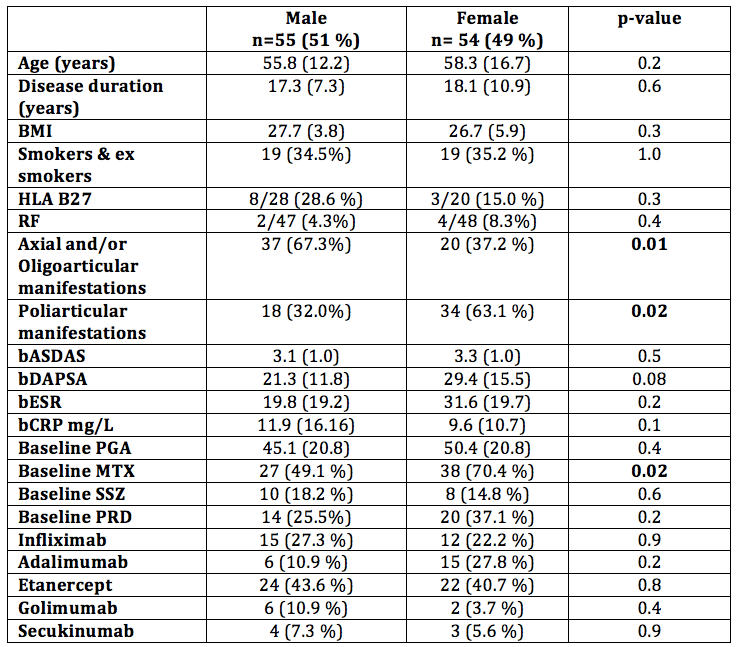Session Information
Session Type: Poster Session (Tuesday)
Session Time: 9:00AM-11:00AM
Background/Purpose:
Growing evidence has pointed gender as a key variable influencing clinical response to biological drugs in psoriatic arthritis(PsA). Although the reasons remain unclear, it has been hypothesized that different clinical presentations could contribute to this gender-related contrast in treatment effectiveness.
Objective: to analyse the disease profile in male and female patients with PsA starting biological treatment.
Methods:
Data from an observational prospective cohort including all patients with PsA initiating biological therapy from 2002-2018 in a university hospital was conducted. Demographic information, laboratory tests, disease presentation (axial presentation, including oligoarticular affection, and poliarticular presentation), disease activity indexes (ASDAS and DAPSA for axial and peripheral-only presentations, respectively) and concomitant treatment were collected before starting biological drug. Patients were stratified by gender to compare the characteristics of the populations. Chi-squared for categorical and t-student tests for continuous variables were used to analyse the differences between groups.
Results:
Out of 109 included patients, 55 (51%) were males and 54 (49%) females. Baseline gender-stratified characteristics are shown in Table 1. Including the whole population of the study, mean age at diagnosis was 57 ± 14.6 years, mean PsA duration was 17.7 ± 9.2 years, and mean Body Mass Index (BMI) was 27.2 ± 4.9. Axial or oligoarticular presentation was shown in 57 patients (52%), whereas 52 patients (48%) had poliarticular manifestations. Mean baseline ASDAS was 3.2 ± 1.0 and mean baseline DAPSA was 25.4 ± 13.6. Biological therapies initiated included etanercept in 42% of the cases, infliximab in 25%, adalimumab in 19%, golimumab in 7% and secukinumab in 6%. No significant differences were observed between genders for most of the characteristics including: age at starting biologic, disease duration, BMI, smoking habit, positive HLA B27 and rheumatoid factor, baseline activity, baseline ESR, baseline CRP, baseline sulfasalazine (SSZ), baseline prednisone (PRD), baseline patient global assessment and biological drug use. However, there was differences between gender in some other characteristics. While males had higher axial presentation of the disease (p=0.01), females had higher poliarticular disease (p=0.02) and used methotrexate more frequently (p=0.02). These differences in methotrexate use might be explained by the predominance of peripheral presentation in female patients.
Conclusion:
In clinical practice, biological therapy (TNFi and IL-17i) is prescribed in a similar frequency in male and female patients with PsA. Nevertheless, the predominant articular manifestation behind the prescription of the biological therapy is different among genders: while men have predominant axial disease, women have predominant peripheral manifestations. These differences in clinical presentation in both genders may contribute to differences in therapeutic management, such as increased use of methotrexate in women with PsA who initiate biological therapy.
To cite this abstract in AMA style:
Benavent D, Plasencia C, Navarro-Compán V, Nuño L, Monjo I, Tornero C, Balsa A. Differences and Similarities According to Gender in Patients with Psoriatic Arthritis Initiating Biological Therapy [abstract]. Arthritis Rheumatol. 2019; 71 (suppl 10). https://acrabstracts.org/abstract/differences-and-similarities-according-to-gender-in-patients-with-psoriatic-arthritis-initiating-biological-therapy/. Accessed .« Back to 2019 ACR/ARP Annual Meeting
ACR Meeting Abstracts - https://acrabstracts.org/abstract/differences-and-similarities-according-to-gender-in-patients-with-psoriatic-arthritis-initiating-biological-therapy/

